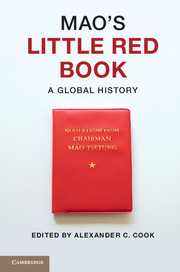Book contents
- Frontmatter
- Contents
- List of illustrations
- List of contributors
- Preface
- 1 Introduction
- 2 A single spark
- 3 Quotation songs
- 4 Mao quotations in factional battles and their afterlives
- 5 Translation and internationalism
- 6 Maoism in Tanzania
- 7 Empty symbol
- 8 The influence of Maoism in Peru
- 9 The book that bombed
- 10 Mao and the Albanians
- 11 Partisan legacies and anti-imperialist ambitions
- 12 Badge books and brand books
- 13 Principally contradiction
- 14 By the book
- 15 Conclusion
- Index
- References
13 - Principally contradiction
The flourishing of French Maoism
Published online by Cambridge University Press: 05 June 2014
- Frontmatter
- Contents
- List of illustrations
- List of contributors
- Preface
- 1 Introduction
- 2 A single spark
- 3 Quotation songs
- 4 Mao quotations in factional battles and their afterlives
- 5 Translation and internationalism
- 6 Maoism in Tanzania
- 7 Empty symbol
- 8 The influence of Maoism in Peru
- 9 The book that bombed
- 10 Mao and the Albanians
- 11 Partisan legacies and anti-imperialist ambitions
- 12 Badge books and brand books
- 13 Principally contradiction
- 14 By the book
- 15 Conclusion
- Index
- References
Summary
If in any process there are a number of contradictions, one of them must be the principal contradiction playing the leading and decisive role, while the rest occupy a secondary and subordinate position. Therefore, in studying any complex process in which there are two or more contradictions, we must devote every effort to finding its principal contradiction. Once this principal contradiction is grasped, all problems can be readily solved.
Methods of Thinking and Methods of WorkFrench Maoism flourished in the decade between 1966 and 1976, coinciding precisely with the Chinese Cultural Revolution. Having germinated slowly since the 1940s, French Maoism thrived in the wake of the Sino-Soviet split and as a result of converging international and domestic circumstances. It wilted in the wake of Mao’s death, amidst the ongoing decline in far-left activism in the late 1970s, and has largely faded, except for a residual cross-pollination in intellectual life that continues even today. The reception of Maoism in France, as elsewhere, was subject to the vicissitudes of “traveling theory” – the dislocation and creative appropriation that attended the translation of Maoist thought into different cultural contexts. Ironically, Mao’s rough-and-ready peasant communism proved especially influential because it took root among the intellectual elite, notably with students at the prestigious École Normale Supérieure and among luminaries such as Louis Althusser, Jean-Luc Godard, Julia Kristeva, Jean-Paul Sartre, and Philippe Sollers. Maoism arrived in France at a fortuitous time, its international promotion by China in the 1960s coinciding with openness in France toward alternative radicalisms. The efforts of the Foreign Languages Press in Beijing, yielding the Little Red Book and, perhaps more importantly, the multi-volume Selected Works, coincided with domestic circumstances in such a way as to allow the seeds of la pensée Mao to fall in particularly fertile soil.
- Type
- Chapter
- Information
- Mao's Little Red BookA Global History, pp. 225 - 244Publisher: Cambridge University PressPrint publication year: 2014
References
- 3
- Cited by



